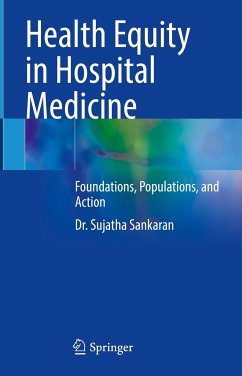This timely and thought-provoking book addresses the full range of health equity issues that impact the practice of hospital medicine, offering a fresh and comprehensive examination of the topic. Drawing from vast clinical experience, as well as from the latest evidence-based literature, the well-published hospitalist author encourages readers to reevaluate established practices and embrace that equitable hospital care must be applied with a systematic framework to ensure that social factors are deeply incorporated into the care provided -- so that it is truly equitable. Indeed, health equity is defined by the World Health Organization as "the absence of avoidable, unfair, or remediable differences among groups of people, whether those groups are defined socially, economically, demographically, or geographically, or by other means of stratification." Health equity has not traditionally been incorporated into inpatient care in an intentional manner, says the author;yet, it is impossible to take care of patients who are acutely ill without taking into consideration the social milieu to which they will return. In fact, although hospital-based physicians are privy to some of the most meaningful moments of people's lives, including life-changing diagnoses, pivotal medical procedures, complex medical decisions, and critical end-of-life decisions, they still have no framework for how to incorporate into clinical decision-making the varied social factors that impact care such as race, gender identity, cultural background, immigration status, sexual orientation, primary language, housing status, and poverty. The goal, emphasizes the author, should be to provide culturally humble healthcare that not only goes beyond speaking in the patient's primary language but that also includes active listening and truly takes into consideration the life experiences and culture that have made patients who they are. Organized in three parts, thebook covers 1) the foundations of health equity 2) specific populations and various issues and 3) a framework and action plan for moving hospital medicine closer to offering consistent, systematic, equitable care. Health Equity in Hospital Medicine: Foundations, Populations, and Action is a call to action and an invaluable addition to the clinical literature. The title will be of great interest to hospital medicine physicians, to allied health personnel working in a hospital setting, and to trainees.
Dieser Download kann aus rechtlichen Gründen nur mit Rechnungsadresse in A, B, BG, CY, CZ, D, DK, EW, E, FIN, F, GR, HR, H, IRL, I, LT, L, LR, M, NL, PL, P, R, S, SLO, SK ausgeliefert werden.









